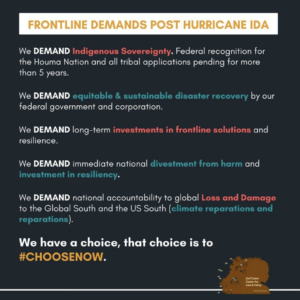A few weekends ago, Hurricane Ida hit the Gulf Coast as a Category 4 and decimated communities, causing many people’s homes to be destroyed and millions to be without power and clean water and with limited access to internet/cell service.
In Pennsylvania, many of us felt the impacts as Hurricane Ida downgraded to a tropical storm and caused severe flooding in many communities, damaging businesses and homes. Hurricane Ida is an example of the ongoing impacts we will all face because of the Climate Crisis. These storms, with their increasing intensity and frequency, are not “natural” disasters but a result of our government protecting the profits of dirty energy companies over the safety of our loved ones. Then, yet another tropical storm dumped rain again on the gulf south, causing extreme flooding.
Appalachia and the Gulf South may be hours apart from one another, but we have a similar stake in driving solutions to mitigate and stop the climate crisis. Working together, as two regions commonly viewed as sacrifice zones, is how we will win solutions that protect our people first. Right now is our time to show up in solidarity and support frontline communities that are leading the recovery from Hurricane Ida. Below are direct asks from people on the ground in Louisiana:
- Help moving more ecologically friendly, justly sourced, and ethically made goods and materials/infrastructure. Purchase from local suppliers over big box stores when possible.
- Help move resources directly to impacted communities: Homa Nation and Gulf South For a Green New Deal both provide immediate relief and also move toward long-term power building and change.
- Keep a manageable pace – commit to providing resources steadily over the next few months, in a coordinated way, instead of all at once right now.
- Always respect what’s happening on the ground.
Building these connections and supporting other communities is going to be a critical need for our future, as now and in the future our government routinely fails to protect and assist the people most impacted by disasters.

